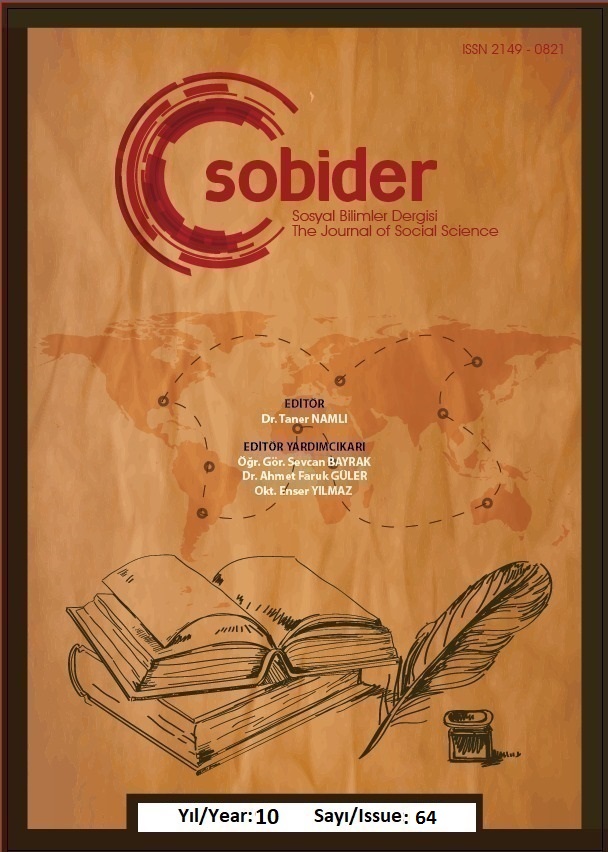Author :
Abstract
Nazar kavramının kendisi, kısmen gözün gücüne çeşitli biçimlerde veya derecelerde hala inanan insanların çokluğu nedeniyle, henüz spesifik olarak tanımlanmamıştır. Hakim algı, nazar edenin kötü veya uğursuz bir şeyin olmasını isteme gücüne sahip olduğu veya bunu istemeden yapabileceğidir. Nazar, belirli kişilerden ve belirli kültürlerde istem dışı olarak yayılan, esas olarak ifade edilmemiş haset veya kıskançlık duygularının sonucu ortaya çıktığına inanılan zararlı bir etkinin yaygın olduğu bir halk kavramıdır ve genelde kıskançlık sebebiyle potansiyel olarak saldırgan veya zararlı bir eylem olarak yorumlanabilir. Bu araştırma makalesinde nazar kavramı çok derin bir şekilde incelenmiş ve öncelikle nazarın dinimiz İslam’da ve Hıristiyanlık, Yahudilik, Hinduizm gibi diğer bazı dinlerde tanımı ele alınmıştır. Nazarın dinlerde mevcudiyetinin anlatıldığı bölümümüzde öncelikle dinimizde nazardan bahseden âyet ve hadisler işaret edilmiş sonrasında ise diğer bazı dinlerde nazarın yer aldığı ifadeler tanıtılmıştır. Takip eden bölümlerde ise toplumların nazara bakışı, nazarın toplumların kültürlerine etkisi, nazardan korunmak için kültürlerde yer alan nazar boncuğu, rukye, muska, kurşun dökme gibi geleneklerin dinimize uygunluğu, nazar değme korkusunun bireylerde yarattığı paranoya ve sosyal problemler, nazar olmaması için bireylerin dili bakımdan kullandığı stratejiler, bireylerin karşısındakine nazar etmeyeceği güvencesini göstermek için iltifatta bulunması ve bu iltifatların farklı Arap ülke ve lehçelerinde örnekleri ile bazı edebi eserlerde nazarın varlığı ve özellikle bunlardan birisi olan mitolojik bir hikâyenin kendi Arapça tercümemizle birlikte sunumu yer almaktadır.
Keywords
Abstract
The concept of the evil eye itself has not yet been specifically defined, partly due to the large number of people who still believe in various forms or degrees in the power of the eye. The prevailing perception is that the nazar thrower has the power to want something bad or sinister to happen, or can do it unintentionally. Evil eye is a common folk concept of a harmful influence that is believed to be the result of involuntary radiating from certain people and certain cultures, mainly as a result of unexpressed feelings of envy or jealousy, and can often be interpreted as a potentially offensive or harmful act out of jealousy. In this research article, the concept of evil eye is examined very deeply and first of all, the definition of evil eye in our religion Islam and some other religions such as Christianity, Judaism and Hiduism is discussed. In the section where the evil eye in religions is explained, first of all, the verses and hadiths that mention the evil eye in our religion are pointed out, and then the expressions that the evil eye takes place in some other religions are introduced. In the following sections, society's view of the evil eye, the effect of the evil eye on the cultures of societies, traditions such as evil eye bead, rukya, amulet, casting lead in our cultures to protect from the evil eye, the appropriateness of the evil eye, the paranoia and social problems caused by the fear of the evil eye, the strategies used by individuals in terms of language to avoid the evil eye, the compliments by individuals with different Arabic dialects to assure not cause evil eye, and the existence of evil eye in some literary works, especially a mythologic one with our own Arabic translation are presented.





